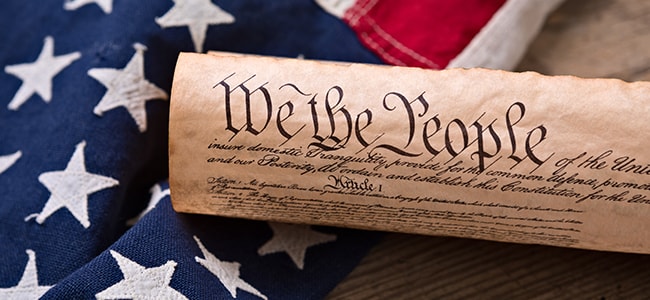Constitutional Law Center

Generally, constitutional law is the foundation of all law in a specific jurisdiction. It establishes governmental authority and power, as well as limitations and grants of rights. The Constitution of the United States established a system of government and serves as the primary source of law. While each individual state has its own constitution, "Constitutional law" generally refers to such law of the federal government.
What is United States Constitutional law?
Drafted in 1787 and adopted the following year, the United States Constitution establishes three branches of federal government, its relationship to and between states, and sets forth the rights possessed by the people.
The Bill of Rights, along with the other Amendments, enumerates rights possessed by the people. For example, the First Amendment protects the right to free speech, press, association and religion. Rights not enumerated are also safeguarded, as the Tenth Amendment provides that all rights not given to the federal government are reserved to the individual states and people.
Articles I, II, and III outline the powers of the federal legislative, executive, and judicial branches, respectively. Along with other portions of the document, these articles create a system of checks and balances among the various branches of government. While some powers are explicitly granted to a distinct branch, such as the power of Congress to regulate interstate commerce (Article I, § 8), other powers are shared by branches, such as the power over the military. Authority over the military arguably belongs to the President as Commander-in-Chief (Article II, § 2); however, Congress has the power to raise and fund the armed forces (Article I, § 8).
Article IV governs the relationship of states to one another, addresses the creation of new states, and establishes a republican form of government. Article V contains the procedure for amending the Constitution. Article VI addresses debts, establishes the Constitution as the highest law (known as the Supremacy Clause) and mandates that officers of all branches of government, federal and state, take an oath to uphold the Constitution. Article VII sets forth the requirements for ratification of the Constitution.
Who interprets the Constitution?
The Supreme Court is the self-proclaimed final arbiter on disputes involving a Constitutional issue. In Marbury v. Madison, (5 U.S. 137, 1803), the Supreme Court inferred this power and has played a critical role in interpreting the Constitution throughout the nation's history. Supreme Court decisions are binding on the parties. Moreover, Supreme Court decisions are part of the body of Constitutional law, and are, therefore, also binding on all other branches—federal and state—of government, and the people (Art. VI).
How do courts interpret the Constitution?
The Constitution is relatively short and its vague and sometimes antiquated language invites varying interpretations. Competing theories have evolved on the appropriate method to use to interpret the meaning of the Constitution. Examples of these diverse methods include "originalists" who maintain the text must be read literally, while "purposivists" seek to discern and achieve the intent of the law on grounds that the Constitution was intended to be a "living document," adaptable to changing society. In vague areas, courts have referred to principles of English common law, on grounds its application was, in some circumstances, intended by the Framers.